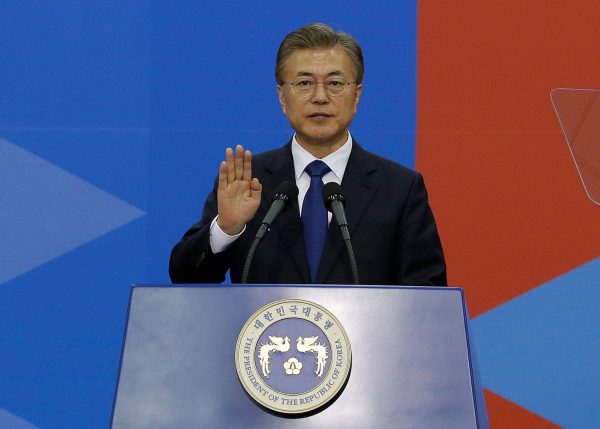Thirteen days were enough time for South Koreans to realise that an ‘imperial presidency’ — a critique of the detached inaccessibility of past presidents — was not a structural issue but a personal matter.
But good things come with bad. On 14 May, North Korea launched another ballistic missile. The South Korean response was quick, with the government denouncing the missile launch and calling for the early establishment of a South Korean missile system and reinforcement of the US alliance.
But this is not the only concern. In a visit to Seoul on May 16, the US National Security Council’s Senior Director for Asia, Matt Pottinger, agreed that talks with North Korea are possible under the ‘right conditions’. But just what are the right conditions?
The Park administration hoped for an early collapse of the Kim Jong-un regime, believing sanctions and pressure would solve the problem. But that outcome has not eventuated. Stanford University professor Siegfried Hecker concluded that Pyongyang is capable of producing six nuclear warheads a year. Just as its recent launch test suggests, development of an intercontinental ballistic missile that can strike the continental United States is not far off. Under such circumstances, ‘strategic patience’ can no longer be the answer.
South Korea cannot sit around and wait for the ‘right conditions’. To secure an initiative in nuclear resolution, pre-emptive talks with North Korea are essential. Working-level talks may be difficult at this point, but roundabout ways — such as behind-the-curtain contacts or civilian exchanges — should be used to engage Pyongyang in discussion. As there is no reason to set up preconditions, Washington’s approval is unnecessary for these preliminary, unofficial contacts.
The ultimate goal is North Korea’s denuclearisation, but negotiations can hardly proceed if South Korea insists it will talk only after denuclearisation. Pyongyang believes its nuclear program is necessary and will never abandon it voluntarily. While stirring Kim Jong-un with sanctions and pressure, an alternative path should be shown. Freezing nuclear and missile development should be the entrance to the negotiation, and nuclear abandonment should be the exit. For the process from freezing to abandonment, South Korea needs to review the three-step roadmap from the February 2007 agreement on the disabling and verifiable abandonment of nuclear facilities.
After defining the path it wants to pursue, South Korea must display as much flexibility as possible. The stick of ‘punishment for provocation’ is maximised only when accompanied by the carrot of ‘flexible benefits in return’. As President Moon stated during the campaign, suspension of North Korea’s nuclear and missiles tests could be paired with the adjustment or temporary halt of the South Korea–US joint military exercises. Parallel pursuit of denuclearisation and establishment of a peace system should also be proactively considered, because again it is important to show a flexible attitude.
The 25 years of the North Korean nuclear threat has taught South Korea a painful lesson of how important imagination and determination are. Until now, South Korea’s fate has been easily decided by foreign powers. Last century’s colonial occupation, war and division were tragic products of foreign powers’ political contests. Considering the weight of the South Korea–US alliance and the geopolitical structure of Northeast Asia, it may be reckless for South Korea to block the influence of its neighbours. But it equivalently won’t be easy to give priority to inter-Korean relations over South Korea–US or South Korea–China relations.
The time has come for South Korea to turn the power of the people and the miracle of the candlelight demonstrations into a driving force for peace on the Korean Peninsula. The nuclear issue is a complicated challenge, but it is surmountable. South Korea needs to stand at the centre of the Korean Peninsula and East Asian diplomacy. In order to not simply be a dependent variable of foreign powers, and to not repeat the fate of the Balkans, South Korea needs to take initiative in resolving the North Korean nuclear crisis. This is how Moon will succeed — or fail.
Moon Chung-in is a former emeritus professor at Yonsei University. He is currently President Moon Jae-in’s special advisor for diplomacy and security affairs.
A version of this article was originally published here at Korea JoongAng Daily.


The author should be commended for this excellent proposal/approach as shown in this post. To achieve the paramount goal of denuclearisation in the Korea Peninsula, it may be necessary that everyone should do some compromise.
I think the offer of suspension of joint military exercises between the US and South Korea in conjunction with asking the North Korea to freeze its nuclear and missile programs is particularly constructive and very helpful, because it is a suggestion of a useful compromise for both of the opposite sides.
I think, depending on the progress in future negotiations of the relevant parties, it may also be helpful and desirable to consider some sort of security guarantee agreement. Such a guarantee may involve the four other parties outside the Korea Peninsula, namely the US, China, Russia and Japan, as guarantors.
Of course such guarantee should not preclude the possibility of Korean unification, should both parties on the Korea Peninsula wish and agree to do so. But it should only be up to the two Koreas as opposed to any outsiders.
Once again I highly commend the author for the excellent ideas presented in this post.
IF North Korea can receive and believe in a security guarantee provided by the US, China, Russia, and Japan, would it be willing to freeze its nuclear development. Would it not have to be willing to allow inspections, however?
The key things are flexibility and initiative by Moon from the South.
I certainly agree with you on flexibility and pragmatism on this. A effective long term and permanent solution is required to address this issue